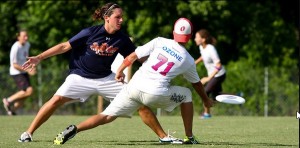
Angela Lin’s forum post on the tryout process reformatted as a blog post. We welcome Angela as a blog contributor.
Hey all, Angela here. I’ve been invited to share my thoughts on the blog, so here we go!
I’m reposting my forum entry on tryouts now. Interested in your thoughts as well, so comment away (or for some of you, again).
There have been some tryout-relevant topics on my mind the last couple years that always seem to crop up around tryout time. just thought I’d throw them out there to see if anyone wanted to discuss with me.
So here’s the situation — You’re nervously getting prepped to try out for a club team. It’s the week before the first round of tryouts. What do you do?
There’s a litany of info around… (the huddle has an early issue devoted to the topic, other resources like ‘inner game of tennis’ or ‘mind gym’ etc or zips tips (see 5/19/03 Paul Greff entry) give you some insight on mental prep, etc).
Despite these resources, I find that many tryouts surprisingly show up a bit clueless. Maybe you’ve been on one or both ends of this – the clueless tryout or the vet who is intrigued (in a bad way) by the clueless tryout. (yes, I certainly feel like I’ve been both).
Some of my personal thoughts on things you must do to avoid being clueless:
1. Physical prep. Superior athleticism is an easy way to stand out if you can achieve it. Obviously you’ve had some time between deciding to try out and the actual tryout dates. Hopefully you used this time to get in pretty awesome shape. If not … hopefully you’re realistic about your expectations (see #2 and #4).
2. Know thyself. By a week out, you should def have made an assessment of your skills – something like, “I’m great at shutdown D on cutters. And keeping the disc moving. And throwing around breaks. And I’m kinda weak on consistently throwing a 40 yd flick. And covering handlers.” Know your strengths and weaknesses, and formulate a plan to showcase your strengths and minimize exposure of your soft underbelly.
3. Your body is a temple. Hydrate. Sleep. Adopt a balanced diet w/ plentiful fruits, veggies, and omega3s. Stretch. Ice.
4. Understand what the team needs. can you accentuate the skills you have that fit those needs? Don’t be afraid to ask the coach, captain, or someone you know best on the team what kind of player the team is looking for. If your strengths don’t exactly fit, all is not necessarily lost (see #5). Unless you possess none of the qualities listed in #5.
5. Know the attributes that a team can always use in its players: consistent O and D fundamentals, self awareness, superior athleticism, good teammates.
6. Bring confidence. But leave your cockiness at home. No one really likes your inner arrogant asshole. I know, it’s shocking.
7. Plan to learn something. There are potentially some world class ultimate players who are vets on the team you’re trying out for. You’ll get to spend a weekend (or two) playing with and defending against them. If you’re a fast visual learner, pick someone who exemplifies your strengths or those strengths you want. Dissect what she does in specific situations, and emulate if you can. (maybe it’s a certain type of throw in a sticky situation, maybe it’s footwork when guarding a deep cutter, maybe it’s timing and spacing of her cuts).
8. Keep working hard throughout. Push the vets and other tryouts. School them. Give it all you’ve got. BUT – don’t injure yourself.
The process is essentially a job interview. Arrive early. Listen. Showcase your strengths. Know your weaknesses so you aren’t caught off-guard by them. Be willing and able to learn. Be enthusiastic, but not over the top. Did I mention be early, avoid showing up hungover, be good sideline support when you’re not on the field, and … be early?
I mean, the guiding principles are to be sensible, be mature, and control your controllables.
Common sense, right? One would think.
other thoughts?
(btw, these opinions are my own and are not intended to be representative of any team for which I may play)

